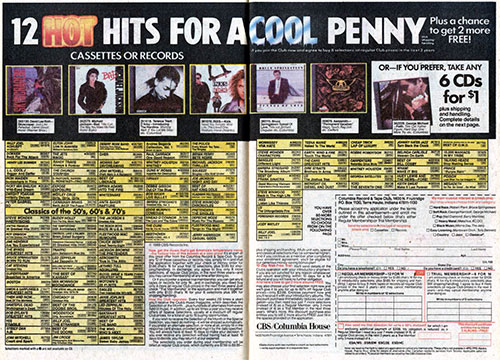Columbia House: The First 12 Cost A Penny, But … – Tedium: The Dull Side of the Internet
by May 30, 2024 Filed under: cassette tapes, cassettes, cd, columbia house, commerce, compact discs, mail, mail order, music, music industry, retail
Today in Tedium: Yesterday, a coworker and good friend of mine revealed to me a fact that made me feel very old. We were talking about Spotify—and his desire not to pay $10 per month for the service—and I referenced Columbia House. He did not know what I was talking about. I was taken aback by this news—I thought everyone knew what Columbia House was! The mail-order CD service (along with its competitor BMG) had a bright moment in the early ’90s, only to see its business model fall apart thanks to iTunes, and later, Spotify. Today in Tedium, we’re going to explain what it was, its effect on the music industry, and the shady business practice that made a penny stretch into a dozen CDs. — Ernie @ Tedium
AOL may have had the most prevalent mail-and-magazine-based marketing campaign of the ’90s, but a close second goes to both Columbia House, which was owned by Sony, and BMG, which was owned by RCA.
It was a common sight in magazines of all shapes and sizes to see ads like the one above, which promoted extremely cheap collections of music in exchange for signing up for a membership. It even singlehandedly helped some CDs become hits—Hootie and the Blowfish, for example, is said to have sold 3 million copies of Cracked Rear View through the service.
And if you watched cable TV during the early ’90s, you probably saw a few commercials for the service. One in particular rivals that recent viral Sizzler promo on the commoditized patriotism front.
But laugh all you want, snake people: Columbia House’s pitch was effective because it was, on the surface, a great deal. A dozen CDs sound like nothing in the age of streaming and MP3s, but it really was a solid carrot back then.
The problem was, there was a stick—and a painful one at that.
— Sasha Frere-Jones, the former New Yorker writer, discussing withA.V. Club the Columbia House business model, which he’s intimately familiar with—because he used to work for the company back in the early ’90s. Frere-Jones worked at the company during the day while boning up his music-journalism chops at night, writing for various zines. If you want to get a better idea of what it was like to work at Columbia House, read the A.V. Club piece, and watch The Target Shoots First, a first-person documentary on the life of a Columbia House manager.
The business model that Columbia House and BMG use is actually something of a precursor to Spotify and other online subscription services.
Columbia House and BMG were the most prominent proponents of negative option billing, which has a history of being used by “of-the-month” clubs. You can’t opt out unless you specifically ask to, and if you don’t, they’re going to ship you more stuff. It has a lot in common with subscription services like gym membership, except for one thing: Because they bill you after the fact, they set the terms.
“Negative option marketing can pose serious financial risks to consumers if appropriate disclosures are not made and consumers are billed for goods or services without their consent,” a Federal Trade Commission report on the practice states. “With the explosion of Internet marketing over the past ten years, negative option offers are as much a fixture of online advertising as in any other advertising media.”
Obviously, this kind of marketing has become even more of a problem online, but fortunately you have some legal precedent in your favor. For one thing, you don’t have to pay for unsolicited merchandise according to federal law.
An example of this is a book service with a similar model, Bottom Line Books. In 2012, Consumer Affairs reporter Mark Huffman wrote about situation where a reader of theirs received a book they didn’t ask for, along with a bill. He recommended sending Bottom Line Books and similar companies a letter.
“While you are not obligated to send a letter to the company stating your intention to keep the merchandise as a free gift, it’s usually a good idea to do so,” he explains. “Your letter may stop the company from sending you repeated bills, and if it’s simply an honest mistake, the letter may help clear the air. You should send the letter by certified mail and keep the return receipt and a copy for your files.”
So, in case you’re wondering: Yes, Columbia House is still around. But not in the way you remember. The company, which was acquired by BMG back in 2005, has no ties to the record industry at this juncture. It doesn’t even sell CDs.
Instead, it relies on a similarly easy-to-ship entertainment product that hasn’t been totally screwed over by digital media as of yet—the DVD. After a set of mergers, Columbia House is now owned by a company called Direct Brands, Inc., which also owns BookSpan, the direct descendent of the Book of the Month Club.
Based on the company’s Glassdoor reviews, Columbia House and its parent company are both dying a very slow, prolonged death. Perhaps as it should be.
Ernie Smith is the editor of Tedium, and an active internet snarker. Between his many internet side projects, he finds time to hang out with his wife Cat, who's funnier than he is.
Find me on: Website Twitter
Get more issues in your inbox
Is it weird to say we love the internet? Because at Tedium, we love the internet—as a source of never-ending research, a vessel for new ideas, and a great historical deep dive. Since 2015, we’ve been throwing two newsletters a week into inboxes the world over, and count more than 12,000 regular readers. And we’d like to keep it going a while longer, so help by sponsoring an issue or supporting us on Patreon. But please: No backlink requests.
What is Tedium? | Support us on Patreon | Share your ideas! | Privacy Policy | Advertise With Us | RSS feed | Ernie on Mastodon
Disclosure: From time to time, we may use affiliate links in our content—but only when it makes sense. Promise.
P.S.: If you email me asking about doing a guest post or posting a backlink, you forfeit ownership of your site to me.
Proudly built on Craft CMS using the Bulma framework.
Copyright © 2015-2023 Tedium LLC. All rights reserved. Please, try the fish.
Like what you’re reading? Be sure to check out the front page of the website, too—it’s full of cool stuff that you probably haven’t read yet.

Leave a comment